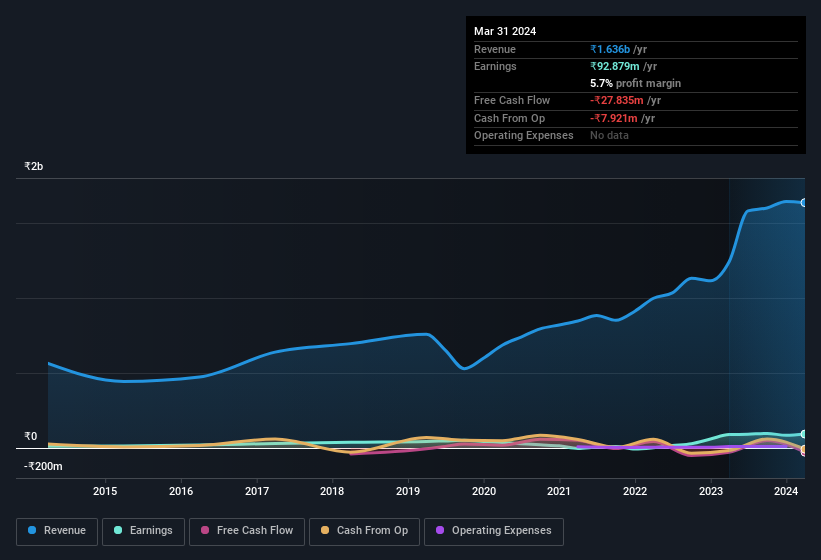Dev Information Technology's (NSE:DEVIT) Profits Appear To Have Quality Issues
The recent earnings posted by Dev Information Technology Limited (NSE:DEVIT) were solid, but the stock didn't move as much as we expected. We believe that shareholders have noticed some concerning factors beyond the statutory profit numbers.
Check out our latest analysis for Dev Information Technology

Zooming In On Dev Information Technology's Earnings
In high finance, the key ratio used to measure how well a company converts reported profits into free cash flow (FCF) is the accrual ratio (from cashflow). In plain english, this ratio subtracts FCF from net profit, and divides that number by the company's average operating assets over that period. The ratio shows us how much a company's profit exceeds its FCF.
That means a negative accrual ratio is a good thing, because it shows that the company is bringing in more free cash flow than its profit would suggest. While it's not a problem to have a positive accrual ratio, indicating a certain level of non-cash profits, a high accrual ratio is arguably a bad thing, because it indicates paper profits are not matched by cash flow. To quote a 2014 paper by Lewellen and Resutek, "firms with higher accruals tend to be less profitable in the future".
For the year to March 2024, Dev Information Technology had an accrual ratio of 0.22. Unfortunately, that means its free cash flow fell significantly short of its reported profits. Even though it reported a profit of ₹92.9m, a look at free cash flow indicates it actually burnt through ₹28m in the last year. We also note that Dev Information Technology's free cash flow was actually negative last year as well, so we could understand if shareholders were bothered by its outflow of ₹28m.
Note: we always recommend investors check balance sheet strength. Click here to be taken to our balance sheet analysis of Dev Information Technology.
Our Take On Dev Information Technology's Profit Performance
Dev Information Technology didn't convert much of its profit to free cash flow in the last year, which some investors may consider rather suboptimal. Therefore, it seems possible to us that Dev Information Technology's true underlying earnings power is actually less than its statutory profit. The good news is that its earnings per share increased slightly in the last year. At the end of the day, it's essential to consider more than just the factors above, if you want to understand the company properly. If you'd like to know more about Dev Information Technology as a business, it's important to be aware of any risks it's facing. To help with this, we've discovered 2 warning signs (1 makes us a bit uncomfortable!) that you ought to be aware of before buying any shares in Dev Information Technology.
Today we've zoomed in on a single data point to better understand the nature of Dev Information Technology's profit. But there are plenty of other ways to inform your opinion of a company. Some people consider a high return on equity to be a good sign of a quality business. So you may wish to see this free collection of companies boasting high return on equity, or this list of stocks with high insider ownership.
New: Manage All Your Stock Portfolios in One Place
We've created the ultimate portfolio companion for stock investors, and it's free.
• Connect an unlimited number of Portfolios and see your total in one currency
• Be alerted to new Warning Signs or Risks via email or mobile
• Track the Fair Value of your stocks
Have feedback on this article? Concerned about the content? Get in touch with us directly. Alternatively, email editorial-team (at) simplywallst.com.
This article by Simply Wall St is general in nature. We provide commentary based on historical data and analyst forecasts only using an unbiased methodology and our articles are not intended to be financial advice. It does not constitute a recommendation to buy or sell any stock, and does not take account of your objectives, or your financial situation. We aim to bring you long-term focused analysis driven by fundamental data. Note that our analysis may not factor in the latest price-sensitive company announcements or qualitative material. Simply Wall St has no position in any stocks mentioned.
About NSEI:DEVIT
Dev Information Technology
Provides information technology enabled services in India, Europe, and internationally.
Flawless balance sheet with solid track record.
Similar Companies
Market Insights
Weekly Picks


Ferrari's Intrinsic and Historical Valuation


Investment Thesis: Costco Wholesale (COST)

Undervalued Key Player in Magnets/Rare Earth
Recently Updated Narratives


Broadcom - A Fundamental and Historical Valuation


Hims & Hers Health aims for three dimensional revenue expansion


A Tale of Two Engines: Coca-Cola HBC (EEE.AT)
Popular Narratives


The "Sleeping Giant" Stumbles, Then Wakes Up


NVDA: Expanding AI Demand Will Drive Major Data Center Investments Through 2026





